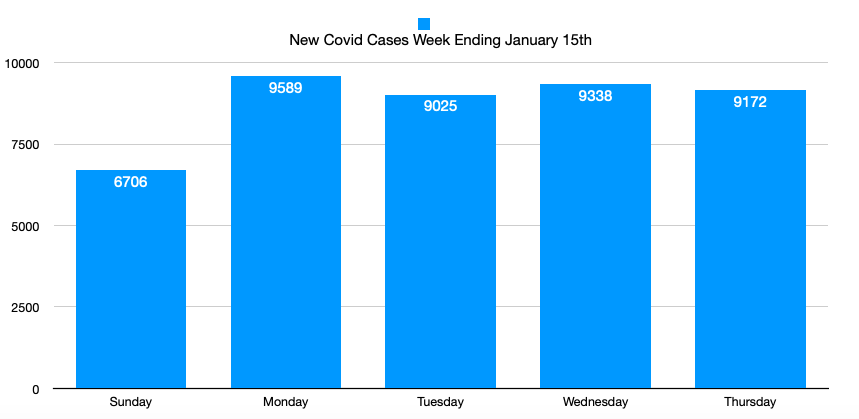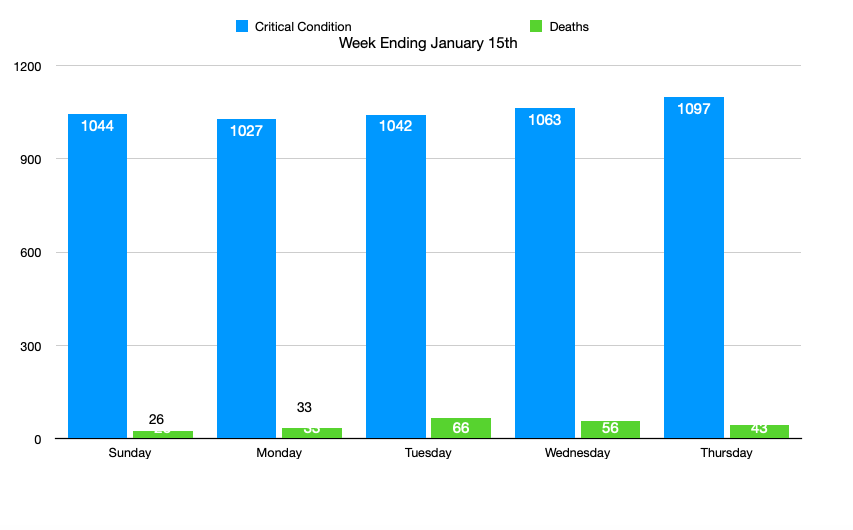The Week Ending January 15, 2021
COVID–19
Israel continued its race against the clock, to both lower its high rate of infection and maintain its high rate of vaccination. Vaccinations have slowed down this week, as HMOs were obliged to give the second shot to those who already received the first dose. By the end of the week, about 75,000 new people per day were vaccinated, with an invitation extended to those over 55 to recieve the shot. Over 2 million Israelis have been inoculated to date — and the overall minimum age to receive a COVID-19 shot was dropped to 50 by the end of the week. In addition, all teachers were cleared to be vaccinated.
There is concern there might be a fall off of interest in vaccination, but it's too early to tell. For the past week, the country has supposedly been in a tighter lockdown. However, other than the schools being closed, there is no sense of silence on the streets, which are still busy during the day (despite the fact most stores are closed). Though admittedly, Tel Aviv streets are much quieter in the evening. For most of this past week, the number of new cases has been over 9,000 per day. With numbers this high, it's hard to see an end to the lockdown in the immediate future. Moreover, the number of deaths over the past two weeks has also been very high, with 500 recorded during this period.


The big question is whether we will see a significant drop off in cases, and more importantly, hospitalizations of the sickest patients by the middle of next week. An initial study by the Clalit (HMO) network showed a 30% drop in transmission following the 14th day after vaccination. By next week we should have real statistical data on people who have received two doses. Let's hope for the best, since Israelis now constitute the largest clinical trial in history. (See my Newsweek article on that)
POLITICS
This past week was one of continued posturing in both the right and left, before expected mergers, (especially in the left-wing). Defense Minister Gantz gave a speech on prime time TV admitting he made a mistake going into the coalition with Netanyahu. He called on those opposing Bibi on the left and center to unite. Gantz stated he was willing to "set aside his ego" and called for a meeting of the parties, the following day. His call was met with a cold shoulder, at least for the meantime. Both Yesh Atid, led by Yair Lapid, and the Israelis party, led by Ron Huldai are polling to determine whether or not joining with Gantz would hurt them. Gantz's party is entitled to substantial funding in the upcoming election; which is money they could gain access to, if Gantz were to merge with one of them.
Meanwhile, the nearly dead labor party is being forced to hold primaries in 10 days due to a court order, after MK Meirav Michaeli sued. The party's current leader, MK Amir Peretz has announced he will not run, thus theoretically leaving the field open to Michaeli. If she does win, she will not have a choice but to merge into another party, since all of the polls show Labor failing to reach the required electoral threshold, if it runs alone. Yesterday, however, most of Labor's Central Committee members wrote to Ehud Barak asking him to run. Israelis have a love-hate relationship with Barak. Polls show that if Barak were to lead the party, it would break the threshold needed to get into the Knesset. Barak is the most dynamic of those who oppose Netanyahu. It's not clear what Barak will decide. If he thinks his entering into the race will help unseat Netanyahu, he will do it; if not, he will pass.
At the same time, on the right-wing, Bezalel Smotrich has decided to break away from Naftali Bennet's Yamina party. Smotrich, a far-right religious settler, has been long seen as an impediment to Bennett's ability to receive support from more moderate voters. Yet, in the second election in latest series, in September 2019 — when Bennet and Ayelet Shaked ran without National Religious support— they did not make it into the Knesset.
Probably the most interesting development this week was Prime Minister Netanyahu's open courting of the Israeli Arab vote. The man who issued a video a few elections ago warning that the Arabs were "rushing to polls," in an attempt to get out his supporters, and who has done all he could to delegitimize the Arab vote, is now trying to reach out to them. A few see this as a Nixon goes to China moment — i.e. that only Bibi can remove the stigma from the Arab voters for the right. However, most see this as a cynical move by Bibi to decrease support for the Joint Arab List, generally depress voter turnout among Israeli Arabs, and perhaps get a few votes from that sector.
MILITARY
On Tuesday night, Israel is said to have carried out one of its most extensive raids on Syria. The attack took place deep inside Syria, aimed at Iranian forces near the Iraqi border. The raid, larger than most of Israel's previous strikes, caused substantial damage and killed many Iranians and members of the militia.
Meanwhile, there were reports that Iran has given the Houthis in Yemen long range drones that have the ability to attack Israel. Israel has reportedly deployed an extra Patriot and Iron Dome battery to the area near Eilat to defend against such an attack. One of Israel's submarines has been deployed in the Red Sea.
At the same time, in an unrelated matter, there have been more and more clashes between the army and settlers in the West Bank. The commander of the commando unit within the Golani Brigade, Sayeret Golani, was assaulted by a demonstrating settler. A police complaint was issued.
ECONOMY
Israel registered a budget deficit of 160 NIS Billion this past year. It's the highest it has ever been. The deficit was caused by significantly increased expenditure due to COVID-19, combined with lower tax revenue. In a normal year, this high level of debt would be a cause of alarm, but as governments throughout the world have adopted similar strategies, the cost of borrowing money is so low, therefore it is not setting off any alarm bells. In fact, just the opposite has happened, as the Israeli Shekel has been the world's strongest currency over the past year, appreciating over 16% against the dollar. The government and the Bank of Israel are worried about the effects of the Shekel's strengthening on the export sector, which Israel is relying on to bring it out of the COVID-19 recession. As a result of the strengthening, Israeli products have gotten more expensive, and foreign investments in Israeli startups require more money to achieve the same goals as before.
An Israeli startup CorNeat KPro announced that its artificial cornea was successfully implanted into a blind patient to replace his deformed cornea. The patient, a 78-year-old male admitted in Bellinson Hospital, regained his sight immediately after removing the bandages, a day after the operation.
IN MEMORIAM: SHELDON ADELSON
Finally, a word regarding the death of Sheldon Adelson — Adelson, who I first knew as the promoter and owner of the Comdex computer show in the 1980s, has had a tremendous impact on Israel, both good and bad. On the positive side, he has given very generously to a long list of Israeli charities supporting many museum, hospitals, and schools. Over the past decade he has been the primary donor to the Birthright program, which has brought tens of thousands of worldwide Jewish youth to Israel. On the negative side, Adelson founded the newspaper Yisrael Hayom, released for free, which has become Israel's most-read paper. The paper has had one main impact: moving the Israeli public to the right on the political spectrum, and deepening support for Netanyahu, which was one of the main reasons Adelson was convinced to start the paper. The paper is undoubtedly one big illegal campaign donation, but nobody has been willing to take up that fight. Adelson's Israeli born wife will most likely take over his affairs, so in the short term, we are unlikely to see any significant change since she has been an active partner in all his activities in Israel.
